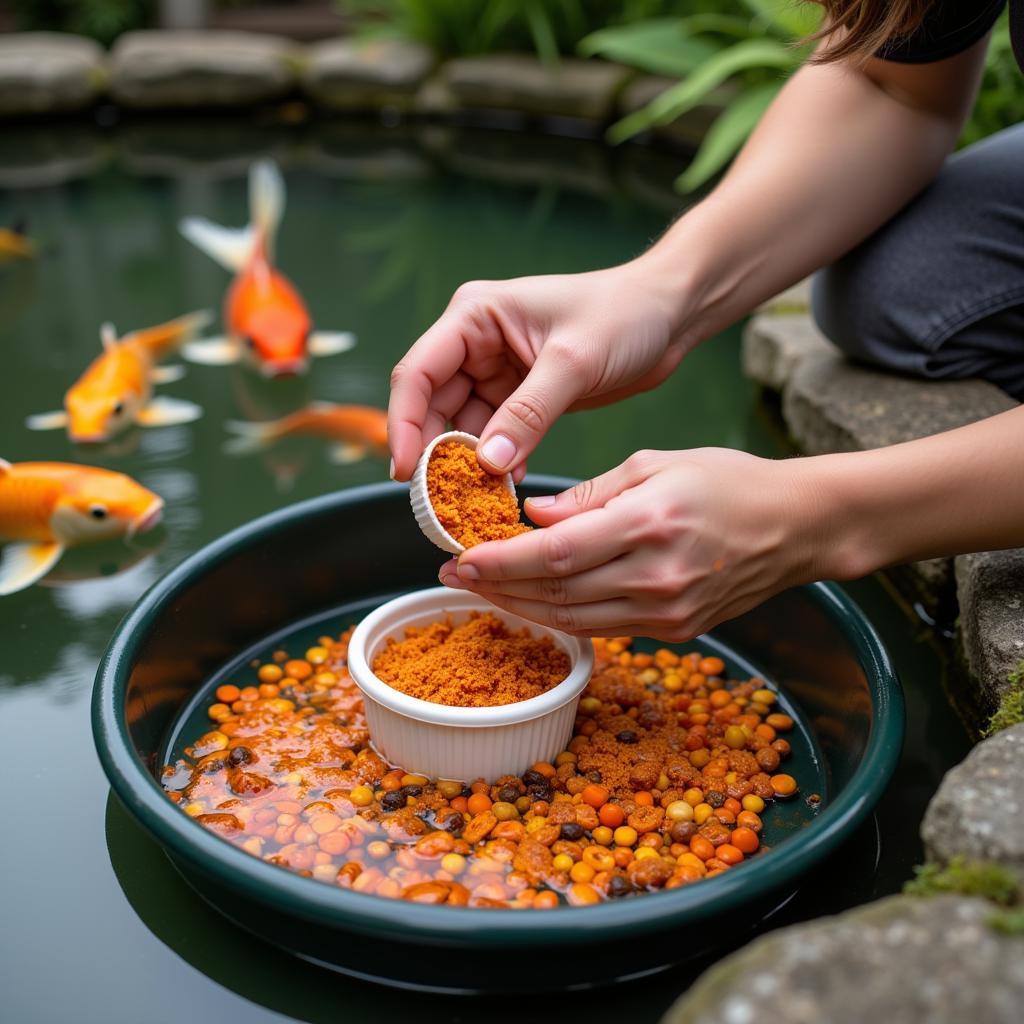Medicated Koi Food is a crucial tool for maintaining the health and vibrancy of your koi pond. This guide will explore the different types of medicated koi food, their uses, and how to choose the best one for your fish. We’ll also delve into preventing disease, recognizing symptoms, and administering medication effectively.
Understanding the Importance of Medicated Koi Food
Koi, like any other living creature, are susceptible to various diseases and parasites. Medicated koi food offers a convenient and effective method for treating and preventing these ailments. It allows for targeted treatment, ensuring the medication reaches the affected fish directly, minimizing the impact on the pond’s overall ecosystem.
Types of Medicated Koi Food
There are several types of medicated koi food available, each designed to target specific health issues:
- Antiparasitic Food: This type of food is formulated to eliminate internal and external parasites, such as flukes, worms, and lice.
- Antibacterial Food: Designed to combat bacterial infections, this food often contains antibiotics to help clear up common koi ailments.
- Antifungal Food: This type of food targets fungal infections, which can manifest as white, cottony growths on the koi’s skin.
Choosing the Right Medicated Koi Food
Selecting the correct medicated koi food is essential for effective treatment. Always consult with a veterinarian or aquatic specialist to determine the best course of action for your koi’s specific needs. They can accurately diagnose the issue and recommend the appropriate medication.
Recognizing Signs of Illness in Koi
Early detection is key to successfully treating koi diseases. Be vigilant for these common signs:
- Loss of appetite: A healthy koi will typically have a hearty appetite.
- Lethargy: If your koi are unusually inactive or spending more time at the bottom of the pond, it could be a sign of illness.
- Skin lesions or discoloration: Unusual spots, ulcers, or changes in skin color can indicate a problem.
- Erratic swimming: If your koi are swimming erratically or rubbing against objects in the pond, they may be experiencing discomfort.
Preventing Disease Through Proper Pond Management
Maintaining a healthy pond environment is crucial for preventing disease. Regular water changes, proper filtration, and a balanced diet contribute significantly to the overall health of your koi.
- Water Quality: Regularly test and maintain the proper pH, ammonia, nitrite, and nitrate levels in your pond water.
- Filtration: Ensure your pond has an adequate filtration system to remove waste and maintain water clarity.
- Diet: Feed your koi a high-quality, balanced diet to support their immune system.
Administering Medicated Koi Food
Follow these steps to effectively administer medicated koi food:
- Quarantine: If possible, isolate the affected fish in a separate quarantine tank to prevent the spread of disease.
- Dosage: Carefully follow the instructions on the medication packaging for the correct dosage and duration of treatment.
- Observation: Closely monitor your koi for any changes in behavior or symptoms.
- Water Changes: Perform regular water changes during treatment to remove any residual medication and maintain water quality.
 Administering Medicated Koi Food to Your Koi
Administering Medicated Koi Food to Your Koi
Conclusion
Medicated koi food is a valuable tool in maintaining the health and well-being of your koi. By understanding the different types of medicated food, recognizing signs of illness, and practicing proper pond management, you can ensure your koi thrive in a healthy and vibrant environment. Remember, early detection and treatment are crucial for successful outcomes. If you have any concerns about your koi’s health, consult with a veterinarian or aquatic specialist.
FAQ
- How long should I feed medicated koi food? Follow the instructions on the medication packaging. Treatment duration varies depending on the specific medication and the condition being treated.
- Can I use medicated koi food preventatively? While some medicated foods can be used for preventative measures, it’s best to consult with a specialist before doing so.
- What are the side effects of medicated koi food? Side effects are rare, but some fish may experience temporary loss of appetite or lethargy.
- Where can I purchase medicated koi food? Medicated koi food can be purchased at most pet stores and aquatic supply retailers.
- Can I feed medicated food to all my koi, even if only one is sick? It’s generally recommended to only treat the affected fish, unless instructed otherwise by a specialist.
- What should I do if my koi doesn’t improve after treatment? Consult with a veterinarian or aquatic specialist for further diagnosis and treatment options.
- How do I store medicated koi food? Store medicated koi food in a cool, dry place, away from direct sunlight.
For further assistance, please contact us at Phone Number: 02437655121, Email: minacones@gmail.com Or visit our address: 3PGH+8R9, ĐT70A, thôn Trung, Bắc Từ Liêm, Hà Nội, Việt Nam. We have a 24/7 customer service team.